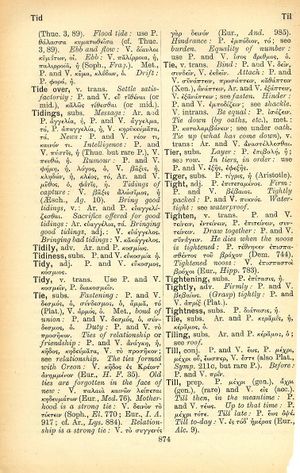tie: Difference between revisions
Θεὸς συνεργὸς πάντα ποιεῖ ῥᾳδίως → Rem facile quamvis peragit adiutor deus → Wirkt Gott als unser Partner, macht er alles leicht
m (Woodhouse1 replacement) |
m (Text replacement - "ἄριθμος" to "ἀριθμός") |
||
| Line 21: | Line 21: | ||
[[hindrance]]: [[prose|P.]] [[ἐμπόδιον]], τό; see [[burden]]. | [[hindrance]]: [[prose|P.]] [[ἐμπόδιον]], τό; see [[burden]]. | ||
[[equality of number]]: use [[prose|P.]] and [[verse|V.]] [[ἴσος | [[equality of number]]: use [[prose|P.]] and [[verse|V.]] [[ἴσος ἀριθμός]], ὁ. | ||
===verb transitive=== | ===verb transitive=== | ||
Revision as of 16:10, 20 June 2020
English > Greek (Woodhouse)
substantive
fastening: P. and V. δεσμός, ὁ, σύνδεσμος, ὁ, ἅμμα, τό (Plato), V. ἁρμός, ὁ.
Met., bond of union: P. and V. δεσμός, ὁ, σύνδεσμος, ὁ.
duty: P. and V. τὸ προσῆκον.
ties of relationship or friendship: P. and V. ἀνάγκη, ἡ, κῆδος, κηδεύματα, V. τὸ προσῆκον; see relationship.
the ties formed with Creon: V. κῆδος ἐς Κρέοντ' ἀνημμένον (Eur., Hercules Furens 35).
old ties are forgotten in the face of new: V. παλαιὰ καινῶν λείπεται κηδευμάτων (Eur., Medea 76).
motherhood is a strong tie: V. δεινὸν τὸ τίκτειν (Soph., Electra 770; Eur., Iphigenia in Aulis 917; cf. Ar., Lys. 884).
relationship is a strong tie: V. τὸ συγγενὲς γὰρ δεινόν (Eur., Andromache 985).
hindrance: P. ἐμπόδιον, τό; see burden.
equality of number: use P. and V. ἴσος ἀριθμός, ὁ.
verb transitive
bind: P. and V. δεῖν, συνδεῖν, V. ἐκδεῖν.
attach: P. and V. συνάπτειν, προσάπτειν, καθάπτειν (Xen.), ἀνάπτειν, Ar. and V. ἐξάπτειν,V. ἐξανάπτειν; see fasten.
hinder: P. and V. ἐμποδίζειν; see shackle.
verb intransitive
tie down (by oaths, etc.), met.: P. καταλαμβάνειν; see under oath.
tie up (what has come down), verb transitive: Ar. and V. ἀναστέλλεσθαι.

